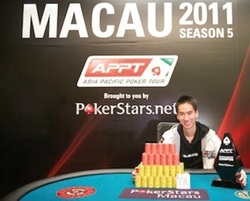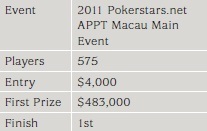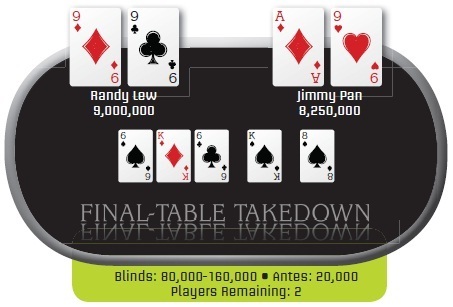






Final Table Takedown: Randy Lewby Craig Tapscott | Published: Jan 25, 2012 |
|
|

Randy Lew

Hand No. 1

Key Concepts: Pot Control; position.
Lew raises to 240,000 on the button holding 7 6
6 . Pan calls from the big blind.
. Pan calls from the big blind.
Flop: 2 6
6 4
4 (pot: 600,000)
(pot: 600,000)
Pan checks.
CT: What’s your read on Pan?
Randy Lew: Pan has been playing pretty aggressive and has been involved in some pots which indicates to me that he’s willing to make moves, which can put me in some tough spots. Especially with the stack sizes being about 40 big blinds effective, he definitely has room to do something.
CT: So what’s the optimal play?
RL: Well this is a board that he can easily put a lot of pressure on me with any sort of draw or made hand, in which case I’m not sure where I stand if I bet the flop and get raised. It’s advantageous for me to be in position as I get to decide whether I want to bet or pot control, etcetera. Also, whatever line I take, I will be able to see how he responds on the turn first then I can act accordingly.
Lew checks.
Turn: 6 (pot: 600,000)
(pot: 600,000)
Pan bets 345,000.
CT: What do you think his range could be to lead out here?
RL: I think when he bets out here, he has a very wide range. There are many hands that he could think are probably best, such as a pair, trips, or flush. I also think he would bet out his air here with good equity such as a hand with a decent heart. Regardless, whether he thinks he has me beat or he’s bluffing, he does have a lot of equity against me.
CT: Please explain.
RL: I think you can make the argument for raising to protect your hand given his likely equity that can overtake me. So, I opted to…
Lew calls.
RL: By calling, I am essentially pot controlling as I do not have enough information on Pan to know what he would do if I raised this turn. If I raise the turn, and he reraises me, it puts me in a real tough spot since my trips have no kicker and I lose to flushes. If he has the nut draw, he might even reraise me all-in and I’m in bad shape if he’s only raising a better hand and the nut draw. So, by calling I do give myself a draw to a boat, and in that case he will likely lose all of his chips if he indeed has a flush. And, if he does have a flush, I’ll be minimizing the losses.
River: K (pot: 1,290,000)
(pot: 1,290,000)
Pan bets 1,285,000.
CT: How do you read this large bet sizing?
RL: It most likely polarizes his range. Given he’s probably betting a polarized range of better trips, flushes, boats, and bluffs, there is little sense in raising the river now for value. All worse hands that are for value will almost certainly fold and there aren’t that many worse value hands he could even have in his range (a king) and of course all better hands will call.
Lew calls. Pan shows J 8
8 . Pan wins the pot of 3,860,000.
. Pan wins the pot of 3,860,000.
Hand No. 2

Key Concepts: Protecting your hand by betting on the turn.
Lew raises the button holding 9 9
9 to 325,000. Pan raises to 925,000 from the big blind.
to 325,000. Pan raises to 925,000 from the big blind.
CT: You’re pretty deep. Should you four-bet or just call in this spot?
RL: I think four-betting and getting in with nines is a fine play, but we are reasonably deep for a tournament and there’s a lot of room for play. Also, I feel that I have an edge in heads-up play as I’ve played a lot of heads-up with strong players at high stakes no-limit cash games. Also, I’m assuming that many tournament players do not have much shorthanded and/or heads-up experience, mainly because tournaments are always played full-ring style. So I wanted to take advantage of what I have while the stacks are still deep.
Lew calls.
Flop: 6 K
K 6
6 (pot: 1,890,000)
(pot: 1,890,000)
Pan bet 925,000.
CT: Seems like a pretty automatic continuation bet spot for Pan.
RL: Yes. I think he would c-bet almost his whole range on this flop. It is such a good and dry board to c-bet since it doesn’t hit my range very hard and he can expect to take it down very often. I imagine he would c-bet some hands that are better than my hand, but I slightly discount better overpairs like T-T, J-J, and Q-Q since he might not think he’s accomplishing much by c-betting. Also, I think he would consider checking if he flopped K-K or something strong like that since he thinks I will fold too much.
Regardless, I think his c-betting range on this flop is almost the same as his
three-betting range, in which case calling would be my best option.
Lew calls.
Turn: K (pot: 3,740,000)
(pot: 3,740,000)
Pan checks.
CT: What information does his check give you?
RL: I would actually expect him to check this card almost always. The flop is double paired in which if he has trip sixes he has to be worried I might have a king. Also, if he has air and I call this flop, my range looks very strong, like a boat, which would not be smart for him to try and bluff me off of. Lastly, if he has the king himself, he probably won’t be betting it again since it looks very strong for him to bet again and he should give me room to bluff or catch up with worse.
CT: Are you leaning toward betting the turn?
RL: Well I think I have the best hand very often and if I’m behind it’s probably against the king or aces, since I expect him to check better overpairs like tens, jacks or queens sometimes on the flop.
CT: What makes that the best play?
RL: My hand is very vulnerable against any Broadway card, which he could have by having a three-bet bluffing type hand. I think he is going to give up very often and I can take away the equity he has by betting him off of free outs. Also, if he has ace-high, I would be value betting against it and protecting my hand, which is great. I can see him calling with ace-high as I can have floats, ace-high, or some counterfeited underpairs like 2-2 through 5-5.
CT: Are there any other reasons for betting the turn?
RL: It serves as a blocking bet in the case that he will check it to me on the river, in which case I can get a cheap showdown, rather than worrying about him firing the river if I check it back. There are so many benefits for me to bet here that outweigh the cons of me putting in a few more chips while behind.
Lew bets 750,000. Pan calls.
River: 8 (pot: 5,240,000)
(pot: 5,240,000)
Pan checks.
CT: When he calls the turn does that better define his range for your river decision?
RL: When he check/calls the turn, he either has me beat or he’s losing with hands like 7-7, 8-8 or ace-high.
CT: Can you value bet thinly here then?
RL: I think it’s a bit ambitious for me to try and get even more value from the hands I’m ahead of at the river. The more likely scenario if I bet again would be that he is slowplaying his boat in which case I’m giving up more chips when I could have taken a free showdown. Given the plan I made for the hand, I easily follow through by quickly checking back the river.
Lew checks. Pan reveals A 9
9 . Lew wins the pot of 5,240,000.
. Lew wins the pot of 5,240,000.
RL: I have one last note to share regarding this hand. Now that I see he’s reraising A 9
9 , I gain a lot of information about his three-betting range, which is great to know as early as possible in our heads-up match. ♠
, I gain a lot of information about his three-betting range, which is great to know as early as possible in our heads-up match. ♠
Features
The Inside Straight
Strategies & Analysis
Commentaries & Personalities